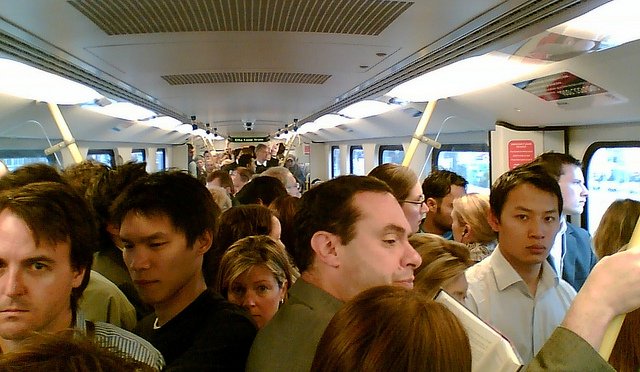
Prime Minister Julia Gillard’s catch phrase for this election is "sustainable". No longer, according to Gillard, should we look to a big Australia, but a "sustainable" population.
In a speech in western Sydney on July 21, Gillard emphasised the squeeze on health services, transport, roads and infrastructure. She hinted her "sustainable population" mantra would ease the squeeze.
Apart from rhetoric largely designed to pander to irrational fears of immigrants and prejudices against asylum seekers, Labor has failed to explain what it means by "sustainable".
The Greens, in contrast, has rejected Labor and the Coalition's scapegoating of migrants and refugees, and has focused its attention on developing policy for sustainable urban development and transport.
"The Prime Minister has sent a sales pitch to Western Sydney on population, but has not outlined ways to move forward on essential services", Greens NSW lead Senate candidate Lee Rhiannon said on August 2.
"The population of Sydney has increased dramatically over the last 10 years; almost as dramatic is the lack of adequate investment in public education, public transport and public health over a similar period."
Rhiannon called for investment in "comprehensive public transport systems for our cities, towns and suburbs, not building rail lines for coal giants".
The Greens have released a sustainable planning and transport policy that restructures transport and urban development to adapt to peak oil and reduce the threat of climate change.
The Greens call for new urban development to be public transport friendly, as well as incorporating clustering and mixed-use development. The Greens want to integrate land-use and transport planning, and to develop better national urban planning standards.
The Greens want "a comprehensive, integrated public transport system, with critical components publicly owned and controlled". They don’t say how they would decide which elements of such a transport system would be considered critical enough to be kept in public hands, and which might stay private.
A renewed rail service is central to Greens policy. The Greens call for public ownership of a national rail service, and say it should be "competitive" with road transport.
They also call for more research into developing alternative fuels to move away from fossil fuels. They also demand scrapping of the fringe benefit tax concession, which encourages company-provided cars to be driven excessive distances to avoid tax, be scrapped.
On July 24, Rhiannon launched the Greens' public transport policy for western Sydney at the Light Horse interchange — the intersection of the M4 and M7 motorways in Sydney's west. "The federal government cannot stick its head in the sand on public transport", Rhiannon said.
"Australia is the only OECD country in which the federal government does not have a formal role in funding and supporting public transport ... The Greens plan includes ending the subsidisation of B-double trucks, which has distorted road-rail competition.
"We also need increased federal investment in the publicly-owned Australian Rail Track Corporation to create local jobs in improving rail freight infrastructure."
The Greens' call for positive action from the federal government on sustainable transport is a welcome initiative. Transport is generally considered a state issue, and often ignored during federal campaigns.
But a 2009 Senate report on Investment of Commonwealth and State Funds in Public Passenger Transport Infrastructure and Services said the federal government had spent $58 billion on roads, $2.2 billion on rail and only $1.5 billion on other public transport in the 30 years to 2004.
In the lead-up to the 2007 federal election, former Labor leader Kevin Rudd's smiling face adorned a billboard on the M5 motorway in south-west Sydney, promising motorists that a Labor government would widen the road. But wider roads just mean more induced traffic, say scientists, which just means more congestion.
Approaching the 2010 election, the M5 remains a mess of roadworks. Congestion is worse, and provision of public transport services has stagnated.
The Greens' sustainable transport policy is far in advance of the two big parties, but it remains incomplete. While calling for greater "incentives" for travelers to switch from the car to public transport, the Greens remain silent on fares.
Public transport is largely government subsidised. Fare-box recovery of the costs of public transport is only at 20-35% of cost, says the Senate report. Increasing the government subsidy to 100% of the cost — providing free public transport — would hugely increase the incentive for use. But Rhiannon opposes this move.
In April 2009, Rhiannon told ABC online the Greens had a "vision" for free public transport, but opposed making public transport free in the short-term. Rhiannon said she was concerned that eliminating fares would limit funds for the expansion of public transport, and that the inflexibility of the system discouraged use more than fares.
Comments
helen.said@optu... replied on Permalink
barn1950 replied on Permalink